SKMA: all flags to us. “Brain diseases: The challenge of the XXI century” how was the forum
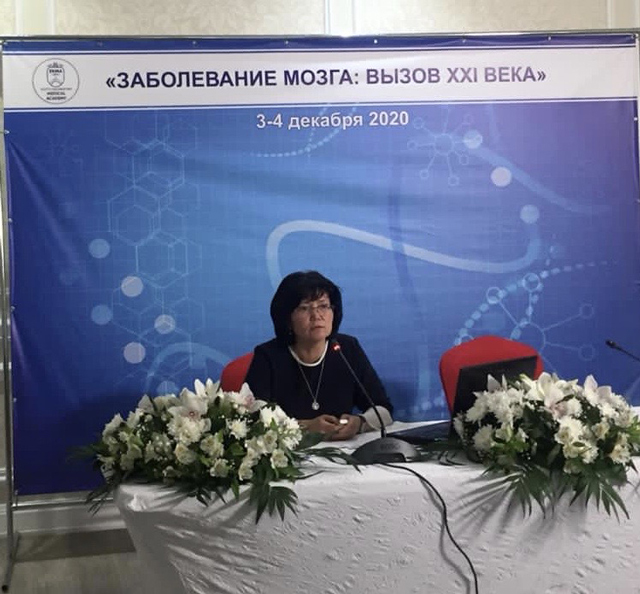
On December 3-4, 2020, the International Scientific and Practical Conference "Brain Diseases: Challenge of the XXI Century" was held by the Department of Neurology, Psychiatry and Psychology staff of the South Kazakhstan Medical Academy via videoconferencing in "Aidane Plaza". It was participated by well-known scientists from Russia, Great Britain, USA, Spain, Ukraine and Kazakhstan.
The rector, professor M.M. Rysbekov addressed to the participants of the scientific forum with a welcoming speech, thanking everyone for the desire to share the results of observations and approaches to the diagnosis and treatment of brain diseases, including during the coronavirus pandemic.
On the first day, Since early morning there were heard the scientific works of undergraduates, residents, doctoral students representing medical universities of Kazakhstan. This section had been lasting for two days, after which the winners were determined for I, II, III degrees.
Speeches of speakers in the section "COVID-19" and neurological complications” aroused particular interest. The moderator of the section, Head of the Department of infectious diseases, professor G.N.Abuova, spoke about the epidemiological situation in the southern region and the peculiarities of coronavirus infection. Docent of the Department of neurology, neurosurgery and neurorehabilitation of the Kirov State Medical University, FirstGenetics, Skolkovo (Moscow, Russia) S.V. Kopishinskaya introduced the neurological complications identified in patients after suffering a coronavirus infection; disturbances included perverted taste, smell, strokes and polyneuropathy. A professor, head of the center for behavioral neurology and head of the laboratory for correction of mental development and adaptation of the Institute of the Human brain named after N.P. Bekhterova (Moscow) L.S. Chutko - drew attention to somatoform disorders in patients of clinics after covid, such as depression, anxiety, fear.
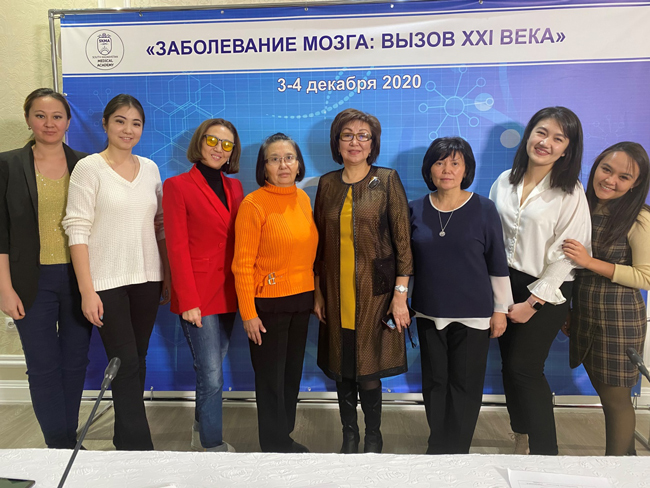
N.A. Zharkinbekova, head of the department of SKMA, organizer of the conference, moderator of the section “Neurological mosaic. Clinical Experience in Diagnostics and Treatment ”provided a microphone for presentations by renowned neurologists from Russia.
A.I. Fedin, Professor, Head of the Department of Neurology, Faculty of Additional Professional Education, Russian National Research Medical University named after N.I. Pirogova (Russia), focused on the aging of the brain and cerebrovascular disease, noted that from the age of 27 the aging of the brain begins, and from the age of 37 - memory impairment, at the basis of cognitive impairment against the background of chronic cerebral ischemia develops a dysfunction of the so-called neurovascular unit, etc.
E.Yu. Solovieva, MD, Professor of the Department of Neurology, HPE RNRMU named after N.I. Pirogova, noted that it is not easy to conduct a search for various types of polyneuropathy, and each treatment should be approached in a personified manner, that is individually, as well as there was raised issues of postcoid polyneuropathy. Then a professor from Ukraine I.K. Voloshin-Gaponov reported new data in the diagnosis and treatment of Wilson-Konovalov's disease.
The section "Neurodegenerative Diseases and Neurogenetics" was headed by Ch.S. Shashkin, Chairman of the "Society of Movement Disorders-Eurasia".

In this section the speakers were: R.B. Kaiyrzhanov, PhD University College of London, a member of the International Society of Movement Disorders and Parkinson's Disease, World Federation of Neurology (London, UK); Henry Holden - Professor of Neurology and Neurogenetics, Head of the Neurogenetic Laboratory at the Institute of Neurology, University College of London (UK); Mi Risig is a professor at the Department of Clinical and Movement Neurosciences at UCL Queen Square Institute of Neurology University College London (UK). The speakers focused on the clinical manifestations and complications after taking antiparkinsonian drugs, talked about the genetic profile of dementia, Parkinson's disease, and discussed the issues of various methods of treating neurodegenerative methods of treatment.
On the second day of the forum in the section "Demyelizing Diseases", where the moderator was M.М. Lepesova, MD, Professor, Head of the Department of Pediatric Neurology, KazMUNO, Almaty, spoke: Mazurchak M.D. - Head of the stroke department of the Karaganda multidisciplinary hospital; M.B. Martazanov - candidate of medical sciences, head of the neurology department of the Akmola regional hospital; Zharkinbekova N.A. spoke also in this section, Khachanova N.V., Ph.D., Professor of the Department of Neurology, Neurosurgery and Medical Genetics; Davydovskaya M.V., Doctor of Medical Sciences, Professor of the Department of Neurology, Neurosurgery and Medical Genetics (both from Pirogov Russian National Research Medical University, Moscow, Russia); Boyko A.N. - Deputy Director of the Center for Coordination and Conduct of Clinical Research, President of the Russian Committee for the Study of Multiple Sclerosis ROKIRS (RUCTRIMS).
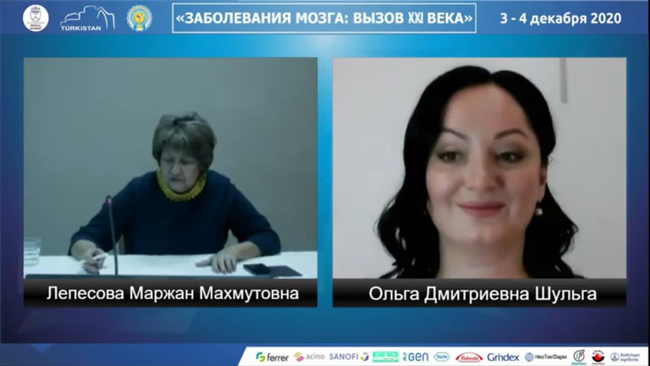
At the end of the forum, the following reports were presented in the section "Stroke Science, Development Prospects": Alexander Razumovsky - PhD, FAHA, Director of Neuro Care for Specialty Care, Secretary of the Neurosonology Research Group (NSRG) World Federation of Neurology (WFN), Baltimore, USA;
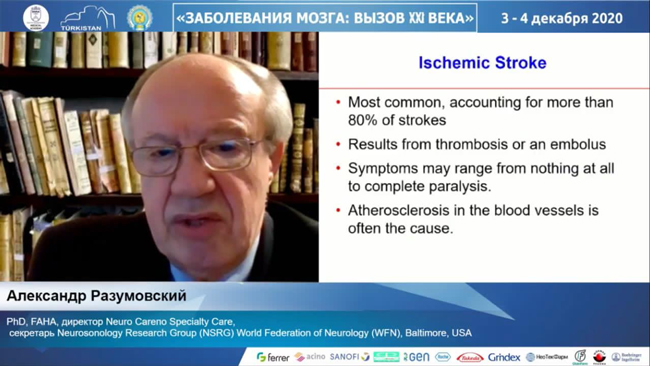
Jersey Krupinski - Head of the Department of Neurology, Professor at the University of Mutua Terrassa (Barcelona, Spain, Manchester, Manchester, UK);
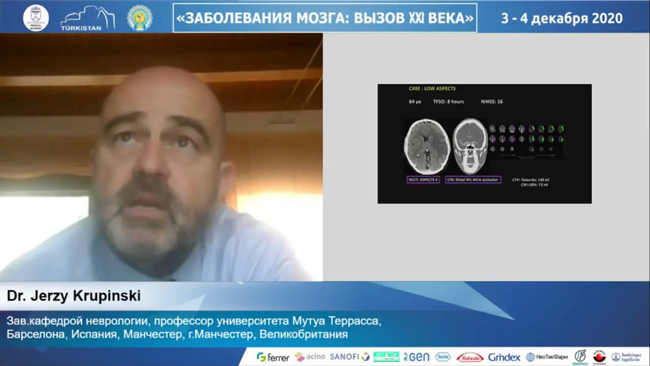
Adilbekov E.B. - Candidate of Medical Sciences, Director of the Republican Coordination Center for Stroke Problems (Nursultan);
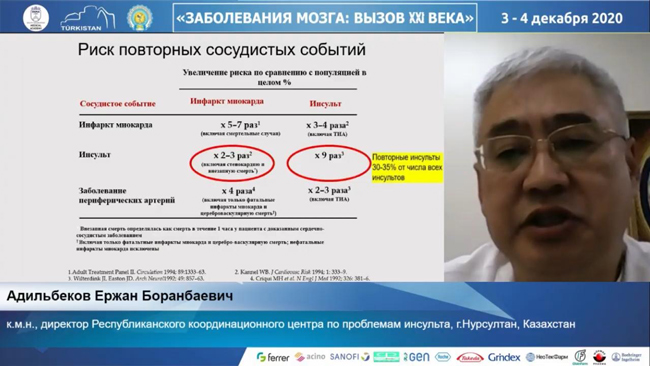
Khaibullin T.N. - Doctor of Medical Sciences, Professor of the Department, Medical University of Semey, etc.
Within two days about four thousand people took part in the international conference. This emphasizes the importance of the scientific forum for foreign and domestic neurologists and therapists. Doctors from Moscow, Tashkent, Ulyanovsk, Nizhny Novgorod, Riga, Kaliningrad, Bishkek, Tomsk, Iletsk, Chelyabinsk, Penza, Cherepovets, Aktobe, Rudny, Ekibastuz, Pavlodar, Ust-Kamenogorsk, Akshetau, Semey and other cities showed interest.
The winners of the youth competition among undergraduates, residents and doctoral students were awarded diplomas, and the participants were awarded certificates in an online format.
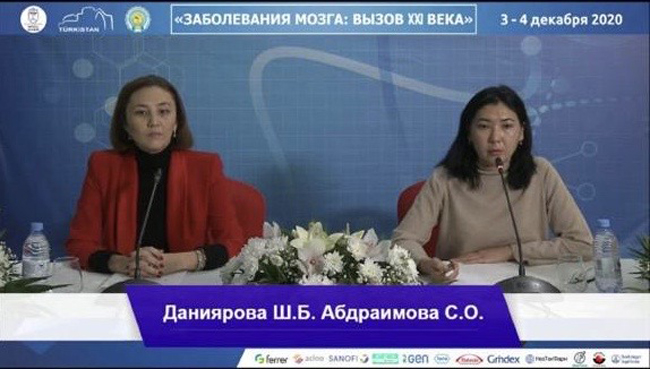
Head of the Department, PhD, associate Professor N. A. Zharkinbekova also noted the support Of the Department of public health of the Turkestan region, the regional clinical hospital, the Department of scientific and clinical work, the master's and doctoral programs of the SKMA.
 778 views
778 views
